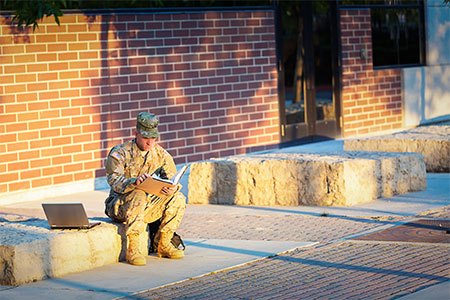July 6, 2021
Law Enforcement Jobs for Veterans

In this Article
While some vets may find work right away, many find it beneficial to take advantage of the G.I. Bill and go back to school.
The G.I. Bill is a valuable benefit for military personnel, and it provides a unique opportunity to get an education using your benefits.
One profession that’s a natural fit for many veterans is law enforcement. The skills learned in the military are often transferable to many law enforcement jobs, such as these:
- Police officer
- Federal law enforcement agent
- Criminologist
- Forensic scientist
The direction you take depends on you: the amount of time you want to spend on your education, and your own personality, desires, and goals.
Law Enforcement and the Police Department
As a veteran, you are particularly well suited to train as police officer, as your military service has already taught you many of the skills required for the job. Police officers maintain law and order, and respond to calls for help. And once you’re on the force, there are great opportunities for advancement, from sergeant all the way up to chief of police.
Your military experience also gives you a good background for detective work. Police detectives talk to victims, witnesses, and suspects to determine what happened at the scene of a crime, and decide whether an investigation is warranted.
Many law enforcement agencies encourage applicants to complete either an associate’s degree or a bachelor’s degree in a criminal justice-related area. Augmenting the experience you gained in the military with a degree will make you a valuable asset to police departments.
Federal Law Enforcement
Federal law enforcement agents have duties similar to those of state and local police officers, and they may work for the FBI, the INS, the DEA, the Department of Homeland Security, and more. They investigate crime, collect evidence, write reports, apprehend criminals, and testify in court. Generally, federal agents specialize in specific types of crime such as trafficking, fraud, or homicide.
The federal government looks for candidates who have college degrees in accounting and finance, science and engineering, or criminal justice. If you’re interested in a law enforcement job at the federal level, you’ll have an advantage if you earn a bachelor’s or master’s degree in one of these areas.
Other Law Enforcement Specialties
Using science to help identify criminals and analyze evidence, forensic scientists support police and federal law enforcement agents in their fight against crime. They may specialize in forensic engineering, forensic entomology, DNA testing, and more.
You can enter the field of forensics with varying levels of education, from an associate’s degree up to graduate-level degrees.
Criminology is the study of crime, criminals, and the law. Criminologists may specialize in drug addiction, juvenile delinquency, and corrections, among other fields, and analyze criminal behavior to help law enforcement agents do their job better.
The education requirements for criminologists are generally higher than for law enforcement agents—you’ll need either a master’s degree or a PhD to get into this field. If you think that your military background would make you a good criminologist, there are great careers helping law enforcement agents understand crime so they can fight it more effectively.
Paying for Your Education
Veterans are highly valued in law enforcement jobs, and the G.I. Bill can help you get the education you need. According to the Veterans Affairs Department, the Post-9/11 G.I. Bill will pay for up to 100% of your law enforcement training (depending on your length of service).
Grants through the G.I. Bill cover all education expenses:
- College tuition and fees
- Monthly housing allowance
- Books and supplies up to $1000 per year
Many veterans finance their education entirely though the G.I. Bill, so when they’re done, they don’t have formidable student loans to pay back. The G.I. Bill is an opportunity that you can’t afford to pass up.
Law enforcement is a natural fit for veterans when they finish their military service. Whether you want to be on the front lines fighting crime as a city, state, or federal law enforcement agent, or working behind the scenes as a forensic scientist or criminologist, there are many opportunities for people with military experience. Get the education you need now and pursue the area of law enforcement that suits you best.
Sources: U.S. Bureau of Labor Statistics; U.S. Department of Justice; New York Times.
